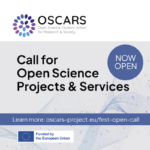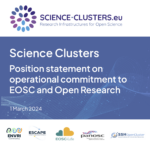H2020 project PaNOSC officially started to contribute making FAIR data a reality

Large-scale research infrastructures produce a huge amount of scientific data on a daily basis. For their storage and future (re)use, data need to managed according to the FAIR principles, i.e., be Findable, Accessible, Interoperable and Re-usable. The adaptation and development of both policies and technologies are key to making FAIR data a reality and to serving the broad set of stakeholders who will benefit from a coherent ecosystem of data services.
Under the headline “European Open Science Cloud (EOSC)”, projects covering a wide range of scientific disciplines from physics, astronomy, and life sciences, to social sciences and humanities, have been funded by the European Commission to build and develop the EOSC, which includes a comprehensive catalogue of services for the storage, management, analysis and re-use of research data.
The project PaNOSC, Photon and Neutron Open Science Cloud is one of five cluster projects funded under the European H2020 programme. PaNOSC started on the 1st of December 2018, and will be officially launched on January 15th, 2019 at the kick-off meeting, which will take place at the European Synchrotron Radiation Facility (ESRF) in Grenoble (France). The project, which will run until December 2022, is coordinated by the ESRF.
By bringing together six strategic European research infrastructures (ESRF, CERIC-ERIC, ELI-DC, the European Spallation Source, European XFEL and Institut Laue-Langevin, ILL) and the e-infrastructures EGI and GEANT, PaNOSC will contribute to the construction and development of the EOSC, an ecosystem allowing universal and cross-disciplinary open access to data through a single access point, for researchers in all scientific fields.
The project will work closely with the national photon and neutron sources in Europe in order to develop common policies, strategies, and solutions in the area of FAIR data policy, data management and data services.
The services developed for data preservation and open access, as well as for data storage, analysis and simulation, will allow users to access data from the catalogues of the existing research facilities in a seamless and easy fashion, for immediate sharing and re-use. Connection to the EOSC Service Catalogue will be an essential step to make the catalogue an entry point to all the available tools and services developed for users in the frame of EOSC-related projects.
The mission of PaNOSC is, therefore, to contribute to the realization of a data commons for Neutron and Photon science, providing services and tools for the many scientists from existing and future disciplines using data from photon and neutron sources. To achieve this aim, the exchange of know-how and experiences will be crucial to driving a change in culture by embracing Open Science among the scientific communities that the project will target.
For such a paradigm shift to take place, actions fostering communication with other EOSC projects from the other clusters, participation in scientific and science policy events, and the development of materials for e-learning for scientists and IT staff, will be carried out throughout the project.


